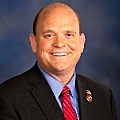- By the office of Rep. Tom Reed
- News
 Print
Print  Tom Reed met with local college organizations, area district attorney offices and community advocacy groups Tuesday in Ithaca to put a spotlight on raising awareness for sexual assault prevention. Representatives from Ithaca College, Cornell University, Corning Community College, the Steuben County District Attorney’s office, Advocacy Center of Tompkins County and local prevention groups joined Reed on the Ithaca College campus to talk about what needs to be done to raise awareness about sexual assault prevention.
Tom Reed met with local college organizations, area district attorney offices and community advocacy groups Tuesday in Ithaca to put a spotlight on raising awareness for sexual assault prevention. Representatives from Ithaca College, Cornell University, Corning Community College, the Steuben County District Attorney’s office, Advocacy Center of Tompkins County and local prevention groups joined Reed on the Ithaca College campus to talk about what needs to be done to raise awareness about sexual assault prevention.“On average, an American is sexually assaulted in the United States every two minutes,” Reed said. “That means during the course of our roundtable, more than 30 Americans were sexually assaulted. That number – any number – is unacceptable. That’s why we’re joining together to talk about ways we can partner and pool resources to talk openly about sexual assault as a community. Until we prioritize education and free-flowing conversations, we won’t be able to get to the root of the problem.”
The group’s main focus was on educating students in middle and high school, before they enter college, on sexual assault awareness and about what healthy, appropriate relationships look like.
“Educating younger students about what are appropriate, respectful actions earlier has the potential to result in drastically different outcomes,” Reed continued. “The earlier we can teach students how to treat one another, the better our odds at preventing sexual assault. That education can’t stop when students are college-aged – we need to make sure awareness and prevention are part of their ongoing education.”
With a staggering percentage of sexual assaults happening each year on college campuses across the country involving young adults under the age of 30, Reed said campus organizations are absolutely necessary resources for prevention and counseling. Aside from early education, the group at Ithaca College talked about the need for students to feel comfortable reporting instances of sexual assault.
“We need to care for victims in every way possible and make sure they have resources, a safe place to go for support and guidance and an environment free of victimization,” Reed said. “As my family continues to face the aftermath of my niece’s sexual assault, it is clear to me each unique case requires its own approach and specific resources. Advocates at the local level are some of the best resources helping victims on a case-by-case basis.”
Other takeaways from the meeting included incorporating studies specifically tailored to tending to the needs of sexual assault victims and the prospect of bringing law enforcement officials into schools to talk directly with students about sexual assault.
Vice President for Human Resources and Safety Services Mary Opperman, who oversees the Cornell University Police Department, added: “The issue of sexual violence on campus has always been one we take very seriously here at Cornell. We recognize the importance of reviewing and revising our policies and practices in order to encourage reporting and, most importantly, to reduce incidents. We are working with students, staff, faculty and alumni through the Council on Sexual Violence Prevention to understand and better respond to our campus concerns. We greatly appreciate that the federal government recognizes the seriousness of these issues and are working in partnership with universities to advance these important efforts.”
Reed continues to work with NO MORE, Rape Abuse Incest National Network (RAINN), National Resource Center on Domestic Violence, National Alliance to End Sexual Assault, AEquitas, Joyful Heart Foundation and NYS Coalition Against Sexual Assault to help raise awareness about sexual assault prevention.
v10i18



